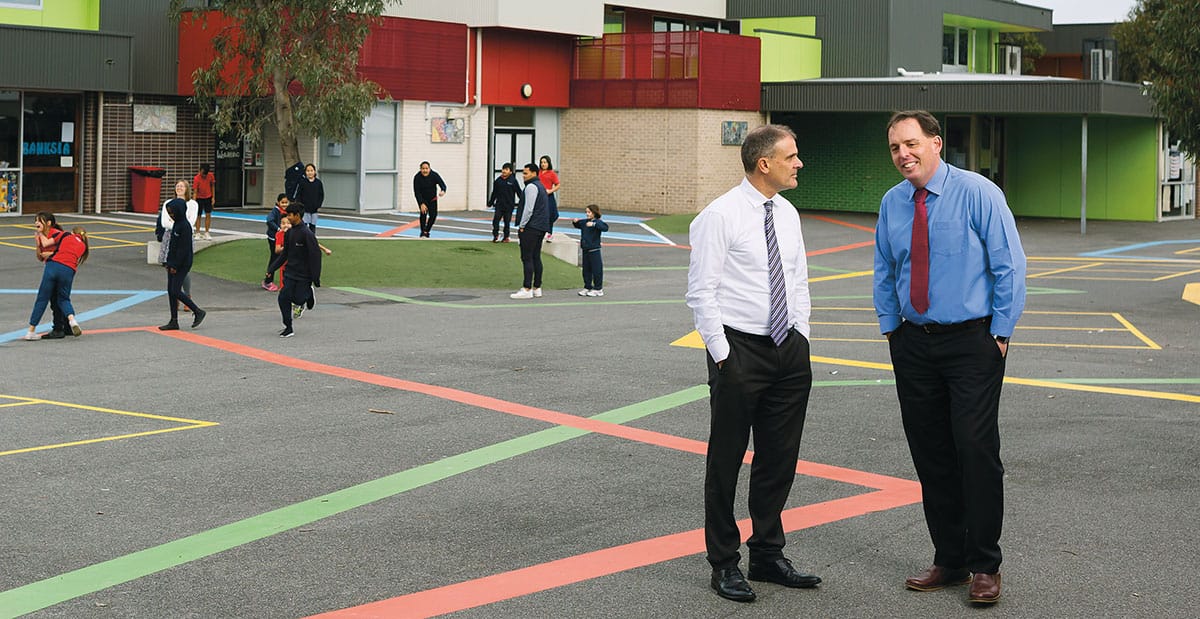
It can be difficult keeping an interview on track when it involves two lifelong educators with a zeal for making a real difference to the people who need it most.
It’s harder when we’re in Butch and Sundance cafe in Aspendale, where Greg McMahon is known to management as well as every second customer walking through the door – and when he and fellow principal Michael Devine are former colleagues with plenty to catch up on.
Fun fact: McMahon, then assistant principal, hired Devine for his first teaching position out of university, at Patterson River Secondary College in Seaford.
There are about 15 years between the pair – McMahon graduated from Monash University in 1982, Devine in 1999, and with a master’s in 2007 – but they have plenty in common, including hailing from families of teachers, and careers that have largely stuck to this geographical swathe of Melbourne.
Nor did either man envisage their current positions at the start of their careers – McMahon is executive principal of Doveton College, Devine is principal at Western Port Secondary College in Hastings – in islands of acute underprivilege in Melbourne’s south, where crusading for change is part of the job.
In a transitional housing area where 90 per cent of people live in rental accommodation, Doveton College has a staggering 30 per cent turnover of students each year. A high number of refugees are from war-torn areas. “There are huge amounts of trauma. School is their consistency, so we’ve made it their safe place.”
More than a classroom
That word: place. The Doveton College template, known as ‘Our Place’, is offering a radical alternative to the traditional educational model. Best described as a learning precinct based in a community hub, it’s an open school (translation: parents aren’t rushed out the door when the bell goes. They can stay all day and access adult learning, community and volunteer programs, employment and allied health services).
“We enrol whole families and go from pre-birth to Year 9,” McMahon says. The school offers maternal and infant healthcare, playgroups and opportunities for parents, as well as their children, to engage and learn.
A lack of bureaucracy is key. “We get them to tell their story one time. If you keep them telling the same story again and again you get them cheesed off, understandably. Without a consistency of relationships, the whole system breaks down.”
Appointments to access services aren’t necessary – in fact, you get the impression that if a parent ventures a vague interest in an educational program or health matter, they’ll be whisked straight off to a person who can help.
“Education is really the key to breaking the cycle of disadvantage.”
Built on a unique partnership between the Department of Education and Training Victoria and the philanthropic Colman Foundation, the Doveton template has attracted interest both nationally and abroad, and is set to be rolled out to another 10 schools around the state.
“The beauty of it is that it really isn’t that expensive to implement,” McMahon says. “Maybe around $1.5 million per school. It’s a small investment for big returns.”
Devine intervention
Within its more traditional Year 7 to 12 model, Western Port offers its own version of educational radicalism. The students here are predominantly the product of an industrial working-class community turned welfare class. “There’s intergenerational welfare, entrenched unemployment,” Devine says. “Some of these kids are way behind in developmental goals.”
Since becoming Western Port principal in 2014, Devine has led a range of programs to boost engagement. An outreach program tries to re-engage young people who have lost any meaningful connection with school. Workers meet them once a week in a range of settings – it might be at home, in the local library or a cafe. “Anything to move them back into the system,” Devine says. “We’ve had about five come back into full-time education, and others keep some sort of connection here.”
Western Port requires teachers with unusual stamina and dedication. “No ordinary teacher will cut it. The kids will chew you up and spit you out before they’ve had breakfast,” Devine says.
The results, however, speak for themselves. NAPLAN and VCE median study scores have improved. No student has fallen below the national minimum standard in numeracy, and the school’s retention rate has almost doubled.
Keys to success
Devine was the only Victorian educator to be recognised in the inaugural Commonwealth Bank National Teaching Awards in 2017, receiving $45,000 towards rolling out a new education project at his school, professional development and an overseas study tour. McMahon was one of two Victorians among the 12 awarded in 2018.
Both engage regularly with the Monash Faculty of Education and are emphatic about what needs to happen to give disadvantaged students a real chance in life. In fact, ask Devine what he would do at Western Port Secondary in a perfect-world scenario and he nods at McMahon: “What he’s doing.”
“Our Place is a positive model,” he explains. “Everything else is a deficit model. I’ve been out to Doveton a few times to see how it works, and it’s impressive, it really is.”
Philanthropy has also been crucial to the successes at Western Port, he points out. But when Year 7 students arrive they’re often already far behind their peers at other schools.
“You don’t need a program like Our Place when you’re talking about students with parents who are engaged with the system,” Devine says. “But with these islands of disadvantage, a birth-to-adult learning model is life-changing. Education is really the key to breaking the cycle of disadvantage.”
WATCH: Michael's Monash graduation speech - 14 December 2018
WATCH: Greg's Monash graduation speech - 29 October 2018





